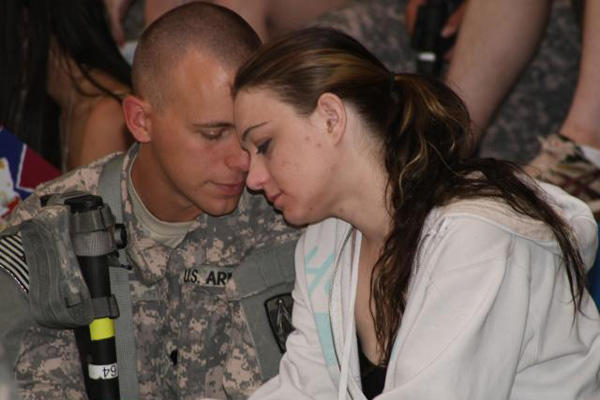When your loved one is called to deploy into harm's way, it is a stressful time for everyone. Stress is a natural and even useful reaction to the fear and frustration that we experience in life. Some military families experience the complete grieving cycle—fear, anger, denial, and acceptance—when preparing for a deployment. Other military families take deployments as they come, accepting them as part of modern military life. There is no "right reaction"; we are all different and it is the way we react to these challenges and conquer and grow from stressful situations that is important.
"I have thought about what I would do if I lost him, but I don't think about it much because I work hard to stay positive during deployments. I want to be an example for other spouses. It is okay to have bad days, but in order to take care of ourselves and our families we have to try and have a positive front."
—Army spouse
"I know people think I'm crazy, but, for us, deployment only helped to strengthen our marriage. We were only married for seven months before he was deployed. Being apart forced us to talk about anything and everything to stay connected. As much as I missed him and worried about his safety, I am grateful for the ways that it enhanced our marriage and helped us grow stronger together."
—Army spouse
For family and friends, it's important to understand and prepare for the emotional challenges of the deployment life cycle so that you can not only take care of yourself but also be as supportive as possible to the deploying service member.
"I try to stay positive and be around people that are going through the same thing."
—National Guard parent
Getting word about a loved one's deployment is just the beginning of an emotional journey that you'll travel over the many months ahead. You may experience anxiety, sadness, frustration, resentment, exhilaration, fear, pride, and even periods of relief. Indeed, many military spouses who are fearful during pre-deployment learn to bask in their independence during a deployment. We can learn a lot about how strong and resilient we are when we overcome challenges presented by a deployment.
"I can't live off fear. We live off faith. I prepare as best I can but there is always something we could have prepared better; we just roll with it. It will all work out. If I have fear, my spouse will sense it in my voice, and I trust my soldier. He is an amazing soldier and he knows his job. I don't have to worry about that."
—Army spouse
Now is the time to focus on keeping yourself healthy, your family stable, and your relationship with your service member secure. There are steps that families, spouses, and friends can take before, during, and after deployment to help alleviate stress, enhance resiliency, and come out of the deployment experience stronger—as a person, as a family, and as a community. Awareness about the challenges of deployment and applying a degree of resilience to cope with the experience enables you to be as supportive as possible to your service member before and after a deployment.
This period can also present an opportunity for increased maturity and growth. Service members and their families often find a renewed sense of purpose and meaning during deployment and emerge with improved self-sufficiency and self-identity. You can capitalize on this time by settingpersonal goals during the deployment.
This excerpt is provided courtesy of the acclaimed free digital resource "Everyone Serves". Download your free copy with additional media content today at everyoneservesbook.com.

















